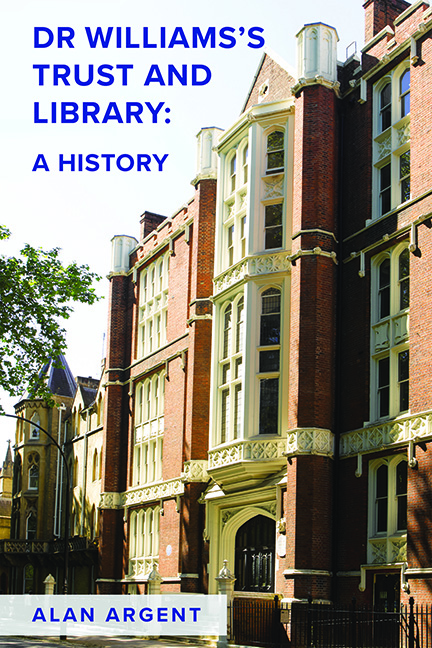Book contents
- Frontmatter
- Dedication
- Contents
- List of Illustrations
- Foreword
- Preface
- Abbreviations
- Notes on Dates, Money, Welsh Place Names and Publications
- Prologue
- 1 Dr Williams and His Will
- 2 Benjamin Sheppard, Receiver 1721–31: Faith, Fitness, and Diligence
- 3 Constructing the Library Building 1725–30: A Proper Plan
- 4 Francis Barkstead, Receiver 1731–47: Piety and Charity
- 5 John Cooper, Receiver 1748–62: Liberty and Liberal Dissent
- 6 Richard Jupp junior, Receiver 1762–95: A Very Respectable Body
- 7 Richard Webb Jupp, Receiver 1795–1850, and David Davison, Receiver 1850–7: Fashionable Sympathies Amid Increasing Light
- 8 Walter D. Jeremy, Receiver 1857–93: The Scrupulous Observer
- 9 Francis H. Jones, Secretary and Librarian 1886–1914: Introducing Order
- 10 Robert Travers Herford, Secretary and Librarian 1914–25: Application and Imagination
- 11 Stephen Kay Jones, Librarian 1925–46, and Joseph Worthington, Secretary 1925–44: A New Age with Old Strains
- 12 Roger Thomas, Secretary 1944–66 and Librarian 1946–66: Trusted Innovator
- 13 Kenneth Twinn, Secretary and Librarian 1966–76: Modest Dependability
- 14 John Creasey, Librarian, and James McClelland, Secretary, 1977–98: Mixed Blessings
- 15 David Wykes, Director 1998–2021: Past, Present, and Future
- 16 Dr Williams’s Trust: An Assessment
- Appendix 1 Trustees in 1723
- Appendix 2 Lists from Short Account (with later additions)
- Bibliography
- Index
5 - John Cooper, Receiver 1748–62: Liberty and Liberal Dissent
Published online by Cambridge University Press: 26 May 2022
- Frontmatter
- Dedication
- Contents
- List of Illustrations
- Foreword
- Preface
- Abbreviations
- Notes on Dates, Money, Welsh Place Names and Publications
- Prologue
- 1 Dr Williams and His Will
- 2 Benjamin Sheppard, Receiver 1721–31: Faith, Fitness, and Diligence
- 3 Constructing the Library Building 1725–30: A Proper Plan
- 4 Francis Barkstead, Receiver 1731–47: Piety and Charity
- 5 John Cooper, Receiver 1748–62: Liberty and Liberal Dissent
- 6 Richard Jupp junior, Receiver 1762–95: A Very Respectable Body
- 7 Richard Webb Jupp, Receiver 1795–1850, and David Davison, Receiver 1850–7: Fashionable Sympathies Amid Increasing Light
- 8 Walter D. Jeremy, Receiver 1857–93: The Scrupulous Observer
- 9 Francis H. Jones, Secretary and Librarian 1886–1914: Introducing Order
- 10 Robert Travers Herford, Secretary and Librarian 1914–25: Application and Imagination
- 11 Stephen Kay Jones, Librarian 1925–46, and Joseph Worthington, Secretary 1925–44: A New Age with Old Strains
- 12 Roger Thomas, Secretary 1944–66 and Librarian 1946–66: Trusted Innovator
- 13 Kenneth Twinn, Secretary and Librarian 1966–76: Modest Dependability
- 14 John Creasey, Librarian, and James McClelland, Secretary, 1977–98: Mixed Blessings
- 15 David Wykes, Director 1998–2021: Past, Present, and Future
- 16 Dr Williams’s Trust: An Assessment
- Appendix 1 Trustees in 1723
- Appendix 2 Lists from Short Account (with later additions)
- Bibliography
- Index
Summary
In the mid-eighteenth century, DWT was consolidating its work in an English society that had changed markedly from Williams's day, with little remaining threat from the Jacobites and from Roman Catholicism. Still the trustees, new and old, adhered scrupulously to the letter, if not the spirit, of the founder's will. On William Travers's resignation in 1755, Nathaniel Neal was appointed the secretary.
A New Receiver's Work – Mrs Roberts's Trust
Francis Barkstead had died by November 1747 when Daniel Adams was appointed receiver pro tem, although only months later he too was dead. Having planned to appoint a new trustee in Barkstead's place as well as a receiver, the trustees opted rather for two officers, namely a receiver and a secretary. The former was to receive the rents of trust property, make payments, supervise and repair trust property, and manage DWL. He was to present yearly accounts, correspond with the schoolmasters, the Irish trustees, and the Scottish bodies, and attend every trust meeting and committee. The secretary was to give notice of trust and committee meetings, record their minutes and assist the trustees and receiver. Reflecting the perceived difference in importance, the receiver was paid £60 a year and the secretary £30, subject to the Master in Chancery's approval. John Cooper junior was chosen receiver and William Travers secretary, but neither became trustees.
The brothers William and John Travers were in August 1748 the only surviving trustees of Mrs Roberts's £60, given annually from Daniel Williams's estate. They had assigned their trust to Francis Boult of Wrexham (who may by then have espoused Arian views), John Kenrick II (d.1803) of Ruabon, Richard Benjamin and John Wright (members of Boult's church), Job Orton, John Kenrick of Bron Clydwr, Messrs Key of Trelawnyd, Key of Whitchurch, Quarrell of ‘Llanwilling’, and Jennings of Newtown. Ebenezer Ke(a)y (1715–79) was minister at Dodington, Whitchurch, in Shropshire from 1739 until his death. The Travers brothers wanted the £60, formerly paid to John Kenrick I of Wrexham, now paid to one of them. The trustees agreed, but by March 1749 John Travers was dead.
Schools and Apprentices – Carmarthen Academy
DWT's secretary, William Travers, in May 1749 asked William Edwards, the Caernarfon schoolmaster, about moving his school to Anglesey, where a dissenting church existed.
- Type
- Chapter
- Information
- Dr Williams's Trust and Library , pp. 83 - 94Publisher: Boydell & BrewerPrint publication year: 2022

